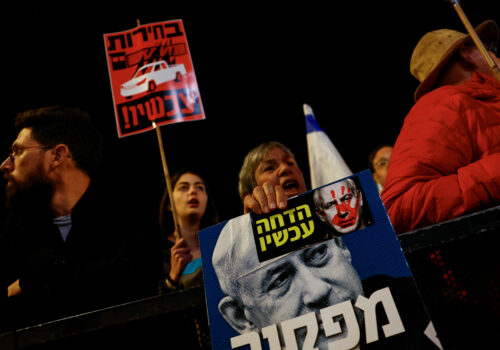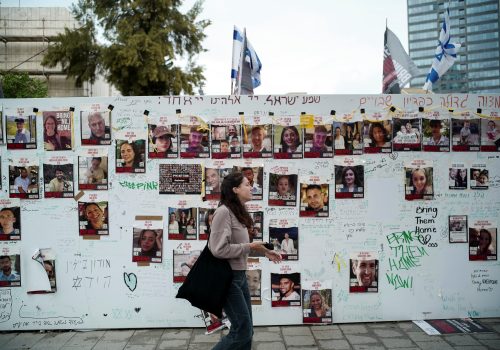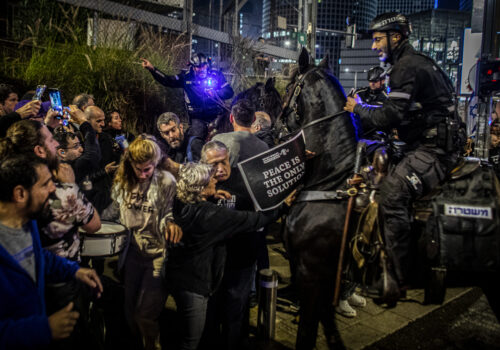Heaven can’t wait: Are Israel’s Haredi parties about to bring Netanyahu down?
Israeli Prime Minister Benjamin Netanyahu’s “viability as leader” and “governing coalition” may both “be in jeopardy,” according to the 2024 Annual Threat Assessment of the US Intelligence Community. The document, which was released on March 11 by the Office of the Director of National Intelligence (ODNI), anticipates “large protests demanding his resignation and new elections” that could give rise to the formation of “a different, more moderate government.”
The ODNI’s predicted outcome could transpire more quickly than imagined—notwithstanding the rejoinder of an irate and anonymous “very senior” Israeli official, who issued a statement reading, “we expect our friends to act to overthrow the terror regime of Hamas and not the elected government in Israel”—but from another direction. The spark would be provided by the crisis surrounding an idiosyncratic feature of Israeli life: the blanket exemption from military service granted to ultra-Orthodox (Haredi) Jews who are enrolled in a Talmudic academy (yeshiva).
Despite enjoying broad domestic support for its war in the Gaza Strip—roughly two-thirds of all Israelis favor the expansion of Israel Defense Forces (IDF) operations into Rafah—Netanyahu’s cohort remains decidedly unpopular among the electorate. (That dichotomy also appears to have infused the evolving approach of the Joe Biden administration, which is reportedly maneuvering to “break” with Netanyahu while “sticking” with Israel against Hamas.)
Against this backdrop, rampant speculation about potential triggers that might accelerate Netanyahu’s political demise has become a national sport. Much attention has focused on the hypotheticals of ministers Benny Gantz and Gadi Eizenkot resigning from the cabinet or of a handful of Likud legislators backing a no-confidence motion to unseat Netanyahu. Circumstances have thrust the question of mandatory conscription for yeshiva pupils—a perennial threat to the stability of Israeli governments—back to center stage.
The mainstream Haredi community—predicated on insularity and a strict interpretation of religious law—reasons philosophically that exposing its members to the influences of secular society, including the ranks of the IDF, would risk compromising their traditional values. Moreover, by their logic, it is precisely from engagement in Torah study that the security of the Jewish people is ensured—in other words, via divine providence—and the ultra-Orthodox are, it follows, the true defenders of the state of Israel. That argument holds scant traction among other sectors of the Israeli public, for whom enlistment is the norm.
SIGN UP FOR THE THIS WEEK IN THE MIDEAST NEWSLETTER
Bringing this clash to its latest boil is a fast-approaching April 1 deadline for the Knesset to approve new legislation that would regulate the Haredi exclusion from the IDF draft—failing which, the state will lack authority to continue precluding the induction of all eligible Haredi men. Attorney General Gali Baharav-Miara has appealed to the High Court of Justice (HCJ) for a postponement, citing delays related to the Gaza fighting. Still, the HCJ has compounded the predicament by ordering the state to provide justification for perpetuating even the current arrangement. A scenario in which all ultra-Orthodox eighteen-year-olds are commanded suddenly to report for IDF duty would likely spell the departure of the Haredi factions from—and precipitate the collapse of—the Netanyahu coalition.
This showdown could scarcely arrive at a more precarious time for Netanyahu, coming on the heels of the Hamas-led October 7, 2023, massacre of more than 1,200 Israelis—a debacle for which the vast majority of Israelis hold him personally culpable. In February, the IDF telegraphed its intention to extend the duration of military tours, necessitated by the urgency of emerging needs and troop losses. Consenting to a wholesale Haredi exemption at the exact moment when hundreds of thousands of IDF regulars and reservists—whose families have borne the physical, emotional, and economic brunt of the war—are being asked to assume additional burdens would be untenable. Ever since Defense Minister Yoav Gallant’s refusal to submit any new conscription bill that does not win the endorsement of the entire government—including Gantz’s centrist Blue and White Party—that exemption is a non-starter.
Netanyahu is scrambling to craft a remedy, including a pledge to his Haredi partners that he will “compensate them retroactively” if the HCJ bars their institutions from receiving public funds over the draft issue. But the spirit of compromise is not in the air.
Banners waved at an ultra-Orthodox demonstration on March 3 cried, “We will die and not enlist.” Later that same week, on March 9, Sephardic Chief Rabbi Yitzhak Yosef—whose salary is paid by the state—ignited a firestorm when he threatened a mass Haredi exit from Israel if immunity from IDF service is revoked. His remarks provoked one financial columnist to opine that the Israeli economy, “which supports yeshiva students, and schools where core curricula are not taught, to the tune of billions of shekels,” would only stand to benefit from such an exodus.
Hopes within Israel that the tragedy that began to unfold on October 7, 2023, might instantly rectify the country’s societal ills seem—at least on this particular score—to have been naively premature. Only 540 of the 66,000 ultra-Orthodox men to have been exempted this year have opted to join the military since the war commenced, according to a representative of the IDF Personnel Directorate. The solidarity that troops from different backgrounds have experienced among their field battalions has not translated into an immediate shift of attitudes among the Haredi population, almost 70 percent of whom believe they should remain excused from the military.
Netanyahu could still surprise naysayers with a fix that satisfies Haredi and HCJ conditions. However, other pitfalls await his government. As far as conscription goes, fundamental change will come slowly, if at all. Meanwhile, all sides are hunkering down for battle.
Shalom Lipner is a nonresident senior fellow for Middle East Programs at the Atlantic Council. From 1990 to 2016, he served seven consecutive premiers at the Prime Minister’s Office in Jerusalem. Follow him on X: @ShalomLipner.
Further reading
Wed, Feb 14, 2024
The ‘day after’ is today: An evasive Netanyahu is abdicating his responsibility for Israel’s fate
MENASource By Shalom Lipner
Trapped between two cabinets with conflicting outlooks, Prime Minister Benjamin Netanyahu has resorted to stonewalling.
Mon, Nov 27, 2023
Why Israel has no imminent plans to wind down its war on Hamas
MENASource By Shalom Lipner
Motivation in Israel, where the trauma of October 7 is still palpable, remains high to persist until the eradication of Hamas and its capability to inflict harm on Israeli targets.
Wed, Mar 6, 2024
Netanyahu might be losing ground, but his politics still resonate with most Israelis
MENASource By Ksenia Svetlova
Polls show that the Israeli public is torn on many issues, but trust in Netanyahu’s government is not one of them.
Image: Ultra-Orthodox Jewish men protest against attempts to change government policy that grants ultra-Orthodox Jews exemptions from military conscription in Jerusalem February 26, 2024. REUTERS/Ronen Zvulun


